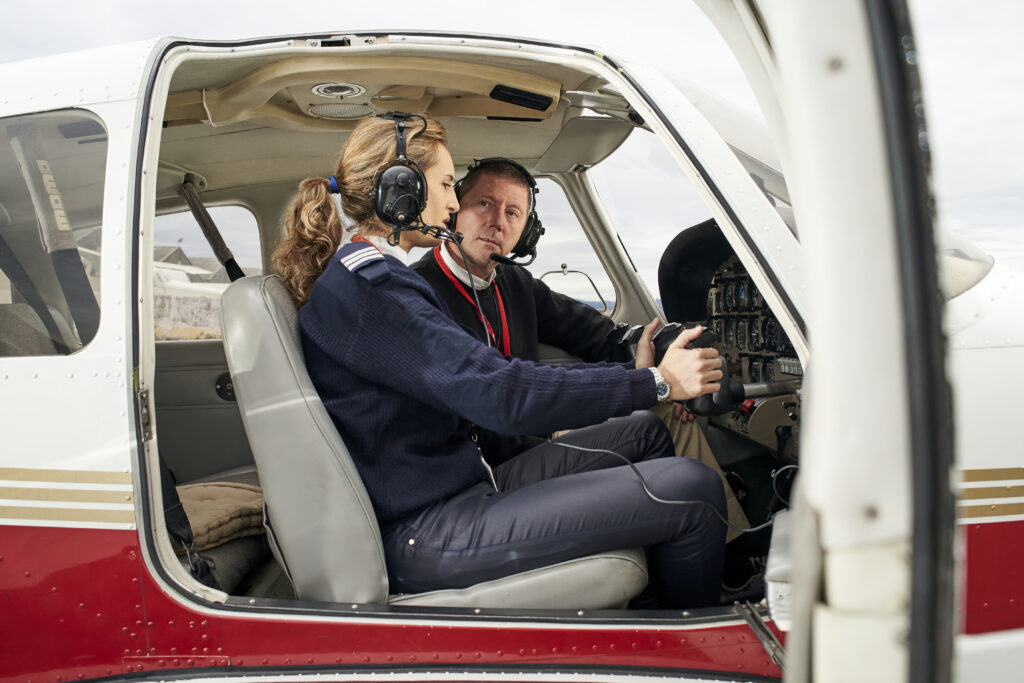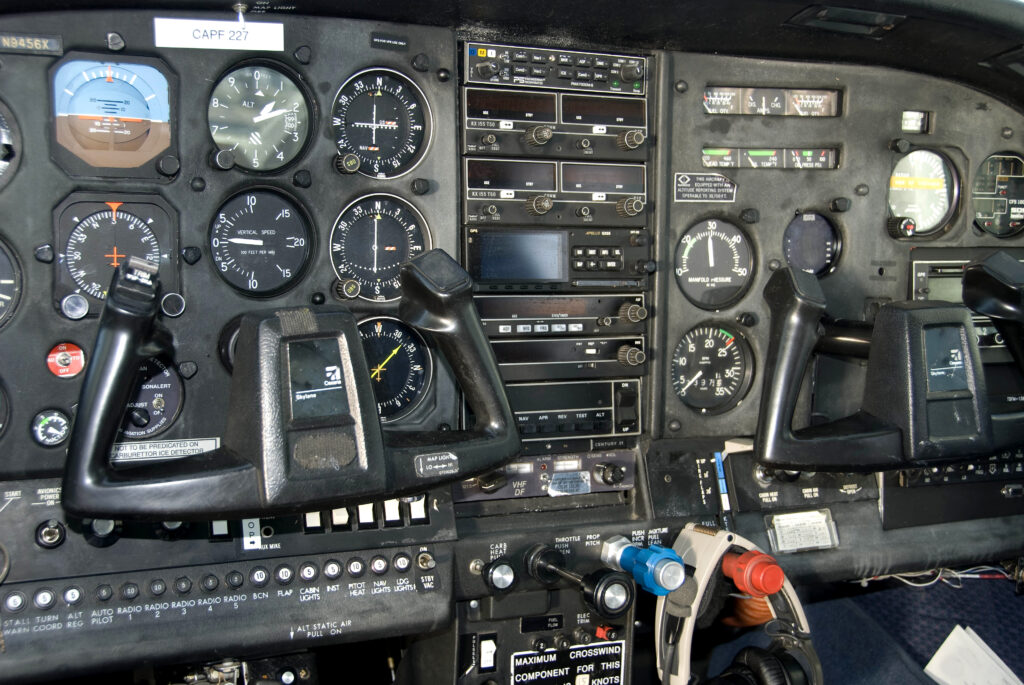So, you’ve decided to become a pilot (cue the Top Gun soundtrack). It’s an exciting goal and there’s a lot to look forward to. But before your training truly begins, there’s an important decision to make: choosing your flight instructor.
Choosing your flight instructor is one of the most important decisions you’ll make as a student pilot. This is the person who will teach you, support you through setbacks, and help you grow your skills and confidence. With the right instructor, your training will be challenging in all the best ways—rewarding, motivating, and fun. An instructor who isn’t a good match can leave you doubting your progress and questioning your goals.
Here’s how to ensure you don’t just find a flight instructor but the right one.
Choose an Instructor You Click With
Flying is stressful enough without adding the learning process on top of it. You’ll be taking in new information, managing multiple tasks, and stumbling through your first few radio calls (don’t worry, we’ve all been there). The last thing you need is to feel like you and your instructor just aren’t quite clicking.

Some students thrive with a no-nonsense, military-style instructor who’s all business and discipline, while others prefer a more easygoing, supportive approach. There’s no right or wrong here. It’s about what suits your personality best. During your first lesson, take notice on how the instructor teaches and communicates. Do they explain things in a way that makes sense to you? Are they patient with your questions? Most importantly, can you see yourself spending 60+ hours shoulder to shoulder with this person?
Find the Teaching Style That Fits You
Every student learns differently, and seasoned instructors know this. A good instructor will adjust to fit your needs, not force you to fit theirs. Some people are visual learners who need to see maneuvers demonstrated over and over again. Others are kinesthetic learners who need to get their hands on the controls immediately. Some students want detailed, technical explanations, while others just need things explained simply.
You need an instructor who teaches in a way that fits how you learn. When explaining lift, some instructors will go deep into Bernoulli’s principle, while others might compare it to the feeling of sticking your hand out a car window. Both are valid approaches. It just depends on which one helps it make sense for you.
Spend some time with MzeroA’s first few modules before your first lesson. Doing this will give you a solid foundation of basic concepts (such as lift) and allow you to judge whether an instructor’s teaching style works based on what you’ve already learned. And, hey, you’ll sound super impressive already knowing about angle of attack versus angle of incidence.
Quality Over Hours
Don’t get too hung up on the numbers. This might surprise you, but the instructor with 5,000 hours isn’t necessarily better than the one with 500 hours. What matters most is the quality of their experience and how much passion they have for teaching.
A newer instructor might be more current on regulations and teaching techniques, and they often have more enthusiasm and time to give to their students. They’re also more likely to remember what it was like to be a student pilot and the specific challenges new learners face.

On the other hand, a veteran instructor brings a wealth of real-world knowledge and has most likely seen about every possible student pilot scenario. They might even have more connections in the aviation community and a more refined teaching method.
The sweet spot is finding an instructor who’s truly passionate about teaching, regardless of their total flight time. At the core, it’s about skill, experience, and a real dedication to seeing students succeed.
Make Sure Your Instructor’s Schedule Works for You

Nothing destroys momentum like inconsistent scheduling. Learning to fly requires building on previous lessons, and long gaps between flights can set you back significantly—and burn through your budget. Before you commit to an instructor, discuss their availability and scheduling upfront. Can they work with your schedule? How many lessons can they accommodate per week? Do they fly on weekends? What if the weather cancels your lesson? And it will. Can they reschedule quickly? How much notice do they need for cancellations?
Some instructors teach full-time, while others balance instruction with other flying jobs. Neither is inherently better, but understanding their able commitment level helps set realistic expectations for your training timeline. The greatest instructor in the world won’t benefit you if they can only fly with you once every two weeks. Consistency often outshines perfection when it comes to flight training progress.
Speaking of consistency (and saving money), combining your flight training with MzeroA’s ground school is a smart move. While you’re working around weather delays and scheduling conflicts, you can continue the momentum with our online courses. Our courses will also keep you prepared for your next flight lesson. Instead of using precious (and expensive) flight and instruction time to cover the basic concepts, you can arrive at the airport already prepared for the day’s topics.
Patience Matters
Learning to fly means making mistakes. Lots of them. Your instructor will watch you practice the same maneuver dozens of times, each attempt slightly different from the last. They’ll endure your creative interpretations of radio calls and your less-than-smooth landings. A patient instructor doesn’t just put up with these moments, they turn them into teaching opportunities that build your skill and confidence.
The Interview
Schedule a brief meet-and-greet or introductory flight with a potential instructor. Come prepared with questions about their teaching philosophy, availability, and experience. Treat your instructor selection like a job interview, because, in a way, you’re hiring them.
Here are some questions you can ask that will give you a better understanding of the instructor and what you could expect if you choose to train with them:

- How long have you been instructing?
- How many students have you trained to completion? What’s your pass rate on checkrides?
- What’s your typical lesson structure? Will we have a syllabus or training plan?
- How often do you recommend flying per week to stay proficient and progress well?
- What do you expect from your students outside of flight time (e.g., ground school, chair flying, pre-brief prep)?
- How do you handle students who are struggling with progression?
- How flexible are you with scheduling, and how far out do you typically book?
- What happens if we get weathered out or the airplane is down for maintenance?
- What do you enjoy most about flight instructing?
- What kind of student do you work best with?
- Is there anything you wish students would ask you before starting training?
Red Flags
Listen to your intuition. If something feels off during your initial meeting or first few lessons, it probably is. Here are some warning signs:
- More focused on hours than you: They seem more interested in time building than teaching.
- Won’t admit what they don’t know: They can’t admit when they don’t know something or get defensive when questioned. Aviation is always evolving. No one knows everything. The best instructors will be honest and use it as a chance to learn together.
- A cancellation habit: Frequent last-minute cancellations for reasons unrelated to weather or maintenance may show they’re not fully committed. You’re dedicated to your training; your instructor should be too.
- Makes you feel small: If an instructor makes you feel foolish for asking questions or making mistakes, that’s a problem. You should always feel safe to ask, learn, and try again.
- Can’t explain clearly: If they struggle to break things down on the ground, it won’t improve once you’re juggling radio calls and flying.
- Poor communication: Vague feedback, unclear expectations, or not telling you what you need to improve on can slow your progress and create frustration.
Finding the Best Instructor May Take a Few Tries
Don’t forget, you’re paying for this service. If things aren’t working out after several lessons, it’s okay to make a change. Give it a fair chance though before deciding. Some personality conflicts resolve as you both get comfortable, and every instructor has a slightly different technique that might take time to click.
But if you find yourself dreading lessons or feeling like you’re not progressing, it might be time to look for a better fit. Good flight schools understand this and will help you switch instructors if needed. Trust your gut. The right instructor for you is someone who makes you feel confident, prepared, and excited about learning to fly.
It All Starts with Choosing the Right Instructor
Take your time, do your research, and make sure you pick someone who fits your goals and learning style. The right instructor will make all the difference in your training. In the end, your success as a pilot starts with this choice. Choose wisely.
